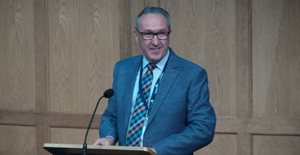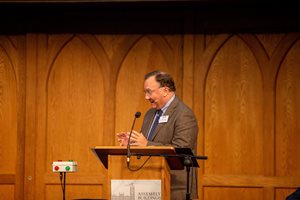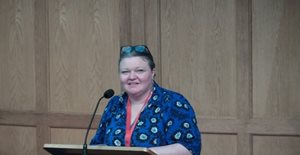Through a number of resolutions put by the Council for Public Affairs, the General Assembly expressed ‘its concern about the significant and rapid increases in the cost of living across Ireland…” Members asked the governments in the Republic of Ireland and Northern Ireland ‘…to not only find ways to mitigate the immediate crisis, but also prioritise the development of anti-poverty strategies in each jurisdiction that begin to tackle the root causes of endemic poverty on the island.’
Looking at devolution in Northern Ireland the General Assembly also expressed ‘its deep regret at the continued and unhelpful undermining of the devolution settlement by the Secretary of State for Northern Ireland…’ The resolution that was carried referenced Mr Lewis’ self-given power ‘…to direct Northern Ireland Executive Ministers and Departments on matters including, but which stretch beyond the provision of abortion services, to education and other areas...’
With the Northern Ireland Assembly still not up and running following last month’s election, the Generally Assembly said that it ‘deeply regretted’ that ‘…all parties have not found themselves in a position to re-form the Northern Ireland Assembly and Executive…’ It also called ‘on all to take the necessary steps to seek honourable accommodations focused on the common good, thereby creating the circumstances through which devolution can be restored.’
 Members also called upon all current Executive Ministers ‘…to find ways of working together collaboratively to address significant issues like healthcare reform, budgetary allocations, education and the cost of living emergency.’
Members also called upon all current Executive Ministers ‘…to find ways of working together collaboratively to address significant issues like healthcare reform, budgetary allocations, education and the cost of living emergency.’
Opening the debate, Rev Daniel Kane, minister of West Church, Ballymena and Convener of the Council for Public Affairs said, “Adorning the Gospel remains the primary calling of every follower of Jesus. The cultural moment we now live in presents a massive opportunity for every Christ-follower to do exactly this, coming as it does in a landscape of unprecedented spiritual climate change…Adorning the Gospel therefore requires a huge amount of investment leading to hopeful and intentional internal and external Gospel conversations.”
Speaking about devolution, Mr Kane said, “The lack of a functioning Assembly at Stormont at this critical time as we emerge from the Covid-19 pandemic, along with the escalating cost of living crisis, Brexit implications, environmental concerns, war in Europe and the refugee and migrant situation is having a profoundly detrimental effect across all sectors of life in Northern Ireland.
“As a General Assembly we have always supported a functioning devolved Government in Northern Ireland as the best form of government for the people... We do recognise, however, that the complexities involved in the delicate balance of power-sharing by way of a mandatory coalition involving diametrically opposed political opinions and perspectives is as difficult as squaring a circle.
“Where the means do exist to allow Executive Ministers to work together to address the current financial crisis, and take other important decisions, even if not optimal, then it is our expressed desire that these should be utilised to their full extent.”
Turning to the cost of living crisis, Mr Kane said that “a core value of Christianity is the command to care for those who are in need…The struggle to pay the heating bills and put food on the table is having a hugely negative effect on the weakest and most susceptible in our society and a significant impact on rural communities in particular. This presents us with the massive challenge of adorning the Gospel with open generosity and practical Good Samaritan style compassion. This will involve us asking the question ‘How will what I do or say express the generous grace and compassion of Jesus so that communities thrive and flourish’…”
 Mr Kane continued, “The Council also whole-heartedly acknowledges the huge amount of vital work done by Church-based foodbanks, hamper ministries and other initiatives in support of those who are disproportionately affected by this crisis. The current cost of energy crisis, however, does raise longer-term questions about energy and food sustainability and security for everyone.”
Mr Kane continued, “The Council also whole-heartedly acknowledges the huge amount of vital work done by Church-based foodbanks, hamper ministries and other initiatives in support of those who are disproportionately affected by this crisis. The current cost of energy crisis, however, does raise longer-term questions about energy and food sustainability and security for everyone.”
Looking at issues around the Northern Ireland Protocol, the General Assembly called upon the European Union ‘to take steps to enable the necessary negotiations with the UK Government to take heed of, and seek to understand, all the areas of concern to significant numbers of people within Northern Ireland…’ Members also called upon ‘the UK Government to enter in to those negotiations as a matter of priority.’
Addressing Members, in his opening remarks referring to the resolution, the Clerk of the General Assembly, Rev Trevor Gribben, who is also Secretary to the Council for Public Affairs said, “This is not an affirmation of any political party’s policy…This recognises the reality that is there and calls upon the European Union to take steps to enable the necessary negotiations to take place.
Mr Gribben continued, “Real negotiations have not taken place since February. There are two sides to these negotiations – one is saying they want to talk, the other side is saying we can’t talk about some of the things that they want to. People need to find a way forward to talk. Negotiations on things like the Protocol is the only way forward because an imposed solution, from either perspective, leaves people feeling winners and losers.”
On legacy issues, the General Assembly noted ‘the overwhelming opposition on all sides of the community to the UK Government’s proposals as laid out in the Northern Ireland Troubles (Legacy and Reconciliation) Bill...’
Members called on the Secretary of State for Northern Ireland ‘…not only to take account of the legitimate views of those who feel that access to justice is being denied by these proposals, but also make necessary amendments during the legislative process to address these concerns.’
During her speech to the General Assembly, PCI’s Public Affairs Officer, spoke about the UK Government’s latest legacy proposals, the Northern Ireland Troubles (Legacy and Reconciliation) Bill. “While there have been some shifts in thinking, the proposals are still removed from the four-strand framework of the Stormont House Agreement which, although in themselves not perfect, continued to offer victims and survivors the opportunity to seek due process and justice in the courts.”
With regards to the undermining of devolution, speaking on behalf of the Council, Miss Jardine said, “There are only so many ways in which to express dismay and disappointment at the Secretary of State for Northern Ireland’s continued determination to undermine the devolution settlement, demonstrated now in education as well as on language and identity, and abortion. Earlier this week such moves were described in the House of Lords as ‘dangerously cavalier’. There are many challenges facing the Northern Ireland Health Service today – waiting lists, staff recruitment and retention, services that are under- resourced. It is curious to note that no interventions appear to be forthcoming in these areas.”
 The Public Affairs Officer continued, “As we near the end of this year’s General Assembly we have been reminded throughout of the depth and breadth of experience of Presbyterian people in service to the Lord within local congregations across Ireland, but also in their various spheres of influence in society, engaging with gracious gospel confidence. As we answer the call of Christ to be salt and light we can, in turn, help to create and shape thriving and flourishing local communities.
The Public Affairs Officer continued, “As we near the end of this year’s General Assembly we have been reminded throughout of the depth and breadth of experience of Presbyterian people in service to the Lord within local congregations across Ireland, but also in their various spheres of influence in society, engaging with gracious gospel confidence. As we answer the call of Christ to be salt and light we can, in turn, help to create and shape thriving and flourishing local communities.
“Nowhere is this more apparent than the area of education where Presbyterian people are involved in all sectors and at all levels. There are those who would like to paint the role of churches, and the place of a non-denominational Christian ethos in education as archaic, unwarranted and possibly even malign…” she said.
In relation to education, in a resolution the General Assembly encouraged PCI’s State Education Committee, and the Republic of Ireland Panel, ‘to engage with proposed changes and reforms to the education system in both jurisdictions; recognise there is no such thing as ‘morally neutral education’, and continue to commend a Christian ethos as a valuable framework for nurturing the holistic wellbeing of children and young people, educationally, emotionally, mentally and spiritually.’
Miss Jardine continued, “It is disappointing that in the commentary and debates on the Integrated Education Bill, which has now become law, fell into lazy stereotypes. There was little acknowledgement of the role played by Shared Education, or that in areas which are naturally integrated and reflective of diverse communities, the local school community in any sector also reflects this diversity…PCI is not against integrated education, far from it, but the integrating of education should not be associated solely with one sector.”
Looking at Hate Crime, in another resolution, the General Assembly recognised that with regard to reforming legislation, ‘…the blunt instrument of the law, even as a last resort, is no substitute for the hard and often challenging work of transforming hearts and minds…’ It called for any legislation developed in this area by the Northern Ireland Executive or Government of Ireland ‘to be handled with wisdom and sensitivity, recognising that the freedom only to express ideas that are popular is no freedom at all.’
Photos: (1) Rev Daniel Kane, minister of West Church, Ballymena and Convener of the Council for Public Affairs (2) Clerk of the General Assembly, Rev Trevor Gribben, who is also Secretary to the Council for Public Affairs and (3) PCI's Public Affairs Officer, Karen Jardine.
The 2022 General Assembly opened on Wednesday, 22 June and closed today, Saturday, 25 June. You can find an overview of its proceedings here.